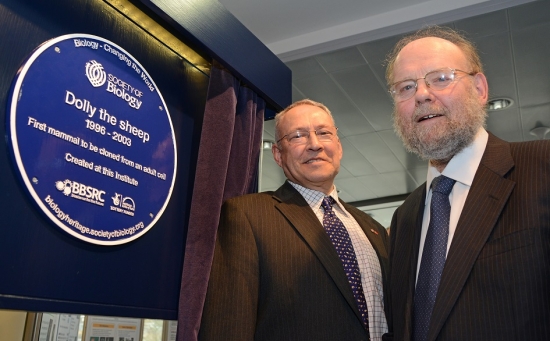News archive
Plaque celebrating Dolly the sheep unveiled in Edinburgh
- Details
- 25 February 2015
A plaque celebrating Dolly the sheep, and the team who created her, was unveiled by the Society of Biology today at The Roslin Institute, University of Edinburgh.

Dolly was the first mammal to be cloned from an adult cell. The Dolly project took place at The Roslin Institute in 1997. The Society of Biology installed the plaque as part of a new series of ten blue plaques around the UK celebrating the eminent but sometimes unsung heroes of biology.
At the unveiling ceremony Sir Ian Wilmut FSB, from The University of Edinburgh, the lead researcher on the Dolly project, (above right) made a speech:
“The birth of Dolly, the first clone of an adult animal, revolutionised our understanding of the mechanisms that regulate development. We used to believe that once a cell had differentiated to a specific tissue type it could not be changed. The birth of Dolly showed that this is not the case. This result stimulated research which is now providing revolutionary opportunities in medicine.”
Dr William Ritchie, from Roslin Embryology Ltd., who worked with Sir Ian on the Dolly project, (above left) also made a speech:
“To make the Dolly experiments successful, many people were involved, from lab technicians to the farm staff caring for the animals to the surgeons and anaesthetists whose skills, successfully transferred the embryos. All the people who gave their skills, effort and dedication to these experiments are immensely proud of the contributions which they made.”
The new series of celebratory plaques include those to: in Suffolk, Dorothy Hodgkin, who discovered the structure of Penicillin; Steptoe, Edwards and Purdy, IVF pioneers, in Oldham; and Richard Owen, who invented the word ‘dinosaur’, in Lancaster.
The ten blue plaques are part of the national Biology: Changing the World project; which also includes a new app, website, public engagement programme and teaching resources. The free app, available in the apple and android app stores, uses your location to introduce you to the great biologists who lived and worked nearby and biological discoveries which were made in the area.
Dr Mark Downs FSB, chief executive of the Society of Biology said:
“We have a great heritage of scientific discovery and an exciting future, but the biologists who have contributed to our understanding of the world are not always given the appreciation they deserve. We are delighted to be giving these biologists the recognition awarded to other great historical figures through Biology: Changing the World. The project is also a celebration of biology and biologists today. The life sciences will be essential for solving the problems of the 21st Century such as food security and antibiotic resistance. By highlighting our great biology heritage we hope to inspire the next generation.”
The Biology: Changing the World project of the Society of Biology was developed in partnership with the Biotechnology and Biological Sciences Research Council (BBSRC) and received funding from the Heritage Lottery Fund.
Professor Jackie Hunter, chief executive of the BBSRC, said:
“I’m delighted that BBSRC has been involved with this scheme to raise the profile of unsung heroes of bioscience who have changed the world with their contributions. We hope that these plaques will spark curiosity and help inspire new generations to get involved in the biosciences, which will continue to change the world and help us meet the challenges of the future.”

